Introduction to Microsoft Dataverse
In the rapidly evolving landscape of business technology, understanding what exactly is Microsoft Dataverse can be a game-changer for modern enterprises. Microsoft Dataverse is a scalable, cloud-based data storage and management service that forms the backbone of the Microsoft Power Platform. By providing a unified and secure data storage solution, Dataverse allows organizations to streamline operations, enhance data accessibility, and drive insightful decision-making.

What is the Microsoft Dataverse?
Microsoft Dataverse is a scalable data platform that enables users to store and manage data securely. It is part of the Microsoft Power Platform, which also includes Power BI, Power Apps, Power Automate, and Power Virtual Agents. Dataverse is designed to simplify data management and integration, making it easier for organizations to harness the power of their data.
Microsoft Dataverse stands out for its robust integration capabilities with other Microsoft services, including Microsoft 365, Dynamics 365, and Azure. This seamless connectivity ensures that data can flow effortlessly across different applications, enabling a cohesive and efficient digital ecosystem. For businesses, the ability to centralize data in a single, secure location means reduced complexity and improved operational efficiency.
Moreover, Dataverse’s compatibility with Power Apps, Power Automate, and Power BI empowers users to create custom applications, automate workflows, and generate detailed analytics without extensive coding knowledge. As a result, teams can respond swiftly to changing business needs, foster innovation, and maintain a competitive edge in their respective industries.
In essence, Dataverse is not just a data repository; it’s a powerful enabler that enhances the functionality and interoperability of the entire Power Platform. By leveraging Dataverse, organizations can unlock new levels of productivity and agility, positioning themselves for success in today’s data-driven world.
Understanding Microsoft Dataverse Architecture
The Microsoft Dataverse architecture is designed to provide a robust, scalable, and secure environment for managing data. At its core, Dataverse offers a comprehensive data model that supports a wide range of business applications. The architecture is built on a relational data storage system, ensuring that data is stored in a structured and easily accessible manner. This relational data storage allows for complex data relationships and ensures that data is consistent and reliable.
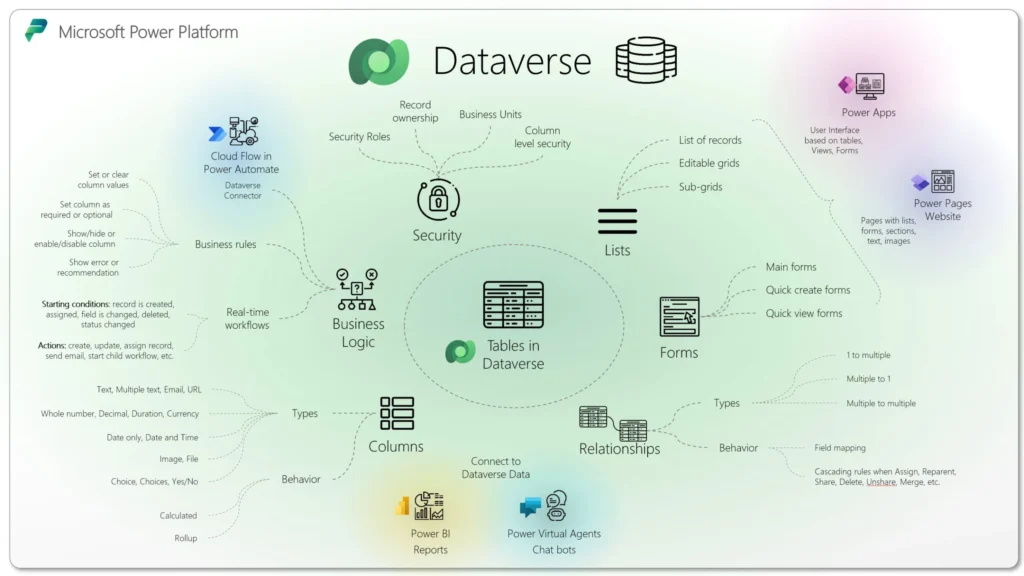
Key components of the Microsoft Dataverse architecture include tables, columns, and rows, which are used to organize and store data. Tables represent entities such as accounts, contacts, or orders, while columns define the data type and constraints for each piece of information within a table. Rows are individual records within a table, each containing data for a specific instance of the entity. This relational structure allows for efficient data retrieval and manipulation, supporting complex queries and operations.
How Microsoft Dataverse Works?
A critical aspect of how Microsoft Dataverse works is its focus on data integrity and security. The architecture includes built-in mechanisms to enforce data integrity rules, such as primary keys, foreign keys, and unique constraints. These rules ensure that data remains accurate and consistent across the system. Additionally, Dataverse incorporates advanced security features, including role-based access control, encryption, and auditing capabilities. These features help protect sensitive data and ensure that only authorized users can access or modify information.
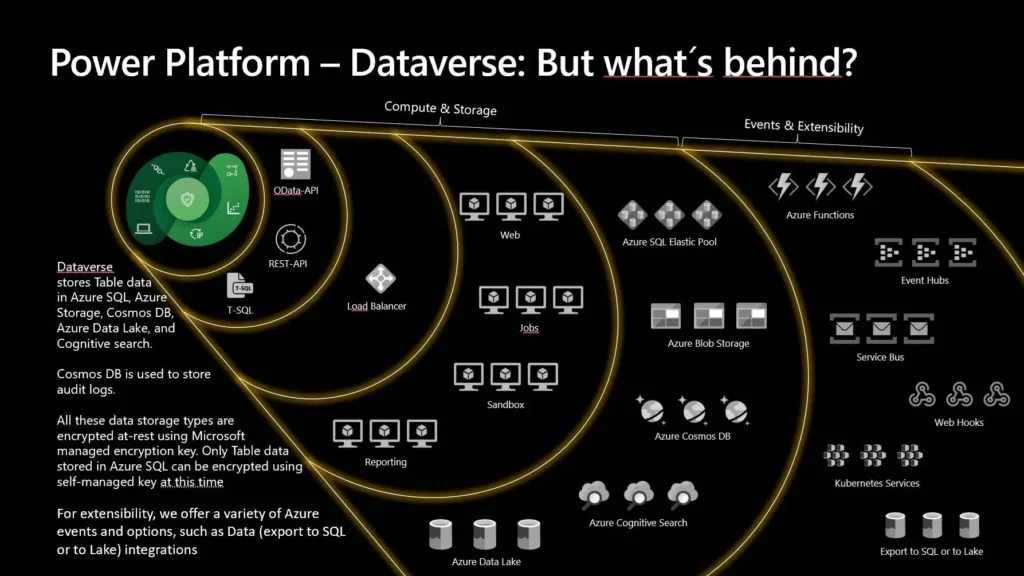
The architecture also supports integration with other Microsoft services and third-party applications, enabling seamless data exchange and interoperability. This flexibility allows organizations to leverage the full potential of their data, driving insights and informed decision-making. By understanding the architecture of Microsoft Dataverse, businesses can better utilize its capabilities to streamline operations, enhance data management, and achieve strategic goals.
Key Features and Benefits of Microsoft Dataverse
Microsoft Dataverse stands as a robust data platform designed to simplify data management and enhance operational efficiency for businesses. One of its core features is secure data storage, which ensures that all business data is stored in a scalable and reliable manner. The platform provides a unified data model, allowing for seamless data integration across various applications and services, thereby reducing silos and fostering a cohesive data environment.
Security is another paramount feature of Microsoft Dataverse. It offers advanced security mechanisms to protect sensitive information, including role-based access control, data encryption, and compliance with industry standards. This comprehensive approach to security ensures that businesses can trust the platform with their most critical data.
Integration capabilities are a significant advantage of Dataverse. It easily integrates with Microsoft Power Platform, Dynamics 365, and other third-party applications, facilitating the flow of data across different systems. This interoperability streamlines business processes and enhances overall productivity by enabling users to leverage data from various sources seamlessly.
Effective data management is another key attribute of Dataverse. The platform provides tools for data validation, transformation, and governance, which help maintain data quality and consistency. By automating these processes, businesses can focus on deriving insights rather than managing data nuances.
The benefits of utilizing Dataverse are substantial. Enhanced data accessibility allows employees to access critical information whenever necessary, fostering better collaboration and informed decision-making. This leads to improved strategic planning and operational efficiency. Additionally, streamlined operations result from the platform’s ability to centralize and harmonize data, reducing redundancies and manual interventions.
Understanding why we need Microsoft Dataverse and what is Microsoft Dataverse used for can illuminate its pivotal role in modern business ecosystems. By providing a secure, integrated, and manageable data environment, Dataverse empowers businesses to harness their data’s full potential, driving innovation and competitive advantage.
What is Microsoft Dataverse for Teams?
Microsoft Dataverse for Teams is like a magic box inside Microsoft Teams that helps you create your own apps, workflows, chatbots, and dashboards. It’s a built-in, low-code platform, which means you don’t need to be a coding expert to use it.
Here are some key points about Dataverse for Teams:
- Relational Data Storage: It can store data in a structured way, just like how we store data in tables.
- Rich Data Types: It can handle different types of data, like text, numbers, dates, and more.
- Enterprise-Grade Governance: It has strong rules and controls to make sure your data is safe and used correctly.
- One-Click Solution Deployment: You can easily share your apps with others in just one click.
- Build and Deploy Apps: It allows everyone to easily create and share apps within Teams.
In simple terms, think of it as a toolset that lets you create your own mini-programs right inside Microsoft Teams. And the best part? You don’t need to be a tech whiz to do it! 😊
Microsoft Dataverse in Action: Use Cases
Microsoft Dataverse offers a robust and highly adaptable data platform that can be utilized across various industries and business functions. Understanding when to use Microsoft Dataverse can help organizations streamline their operations, enhance decision-making, and foster innovation. Below, we explore several real-world use cases that demonstrate the versatility and power of Microsoft Dataverse.
In the healthcare industry, Microsoft Dataverse can be pivotal in managing patient records, scheduling appointments, and ensuring compliance with regulatory requirements. By centralizing patient data, healthcare providers can improve patient care and operational efficiency. For instance, a hospital could leverage Dynamics 365 Dataverse to integrate patient management systems, providing a seamless experience for both medical staff and patients.
The retail sector also benefits significantly from Microsoft Dataverse. Retailers can use this platform to manage inventory, track customer preferences, and analyze sales data. By utilizing Dataverse for Teams, retail employees can collaborate more effectively, share critical insights, and respond swiftly to market changes. For example, a retail chain might use Dataverse to synchronize data from various store locations, ensuring consistent inventory levels and customer service quality.
In the realm of finance, Microsoft Dataverse can streamline processes such as risk management, compliance tracking, and customer relationship management. Financial institutions can use Dataverse to consolidate data from multiple sources, enabling a comprehensive view of client interactions and financial activities. This centralization not only enhances data integrity but also supports advanced analytics and reporting capabilities.
Manufacturing companies can leverage Microsoft Dataverse to optimize supply chain management, monitor production processes, and facilitate predictive maintenance. By integrating Dataverse with IoT devices and other enterprise systems, manufacturers can gain real-time insights into their operations, reducing downtime and improving productivity.
Finally, the education sector can utilize Microsoft Dataverse to manage student information, track academic performance, and streamline administrative tasks. Educational institutions can create custom applications using Dynamics 365 Dataverse to enhance the learning experience and ensure data consistency across various departments.
These examples illustrate the broad applicability of Microsoft Dataverse across different industries, showcasing its potential to transform business operations and drive innovation.
Comparing Microsoft Dataverse with Competitors
In the landscape of data management platforms, Microsoft Dataverse competes with several robust alternatives, each offering unique features and capabilities. Understanding how Microsoft Dataverse stacks up against its competitors is essential for businesses seeking an optimal data solution.
Microsoft Dataverse Competitors
While Microsoft Dataverse is a powerful data platform, there are other competitors in the market, including:
- Salesforce’s MuleSoft: A popular CRM platform that offers extensive data management capabilities.
- Amazon Web Services (AWS): Offers various data services, including Amazon RDS and DynamoDB.
- Google Cloud’s BigQuery: Provides comprehensive data storage and management solutions.
Salesforce’s MuleSoft: One of the primary competitors of Microsoft Dataverse is Salesforce’s MuleSoft. MuleSoft is renowned for its integration capabilities, enabling seamless data connectivity across various applications and systems. However, Microsoft Dataverse excels in its native integration with the Microsoft ecosystem, including Dynamics 365, Power Apps, and Azure. This tight integration ensures a more cohesive user experience for organizations already invested in Microsoft’s suite of tools.
Amazon Web Services (AWS):An additional competitor is AWS’s Amazon RDS (Relational Database Service). Amazon RDS offers robust database management, scalability, and reliability. While it provides a powerful platform for database management, it lacks the low-code/no-code application development capabilities that Microsoft Dataverse offers. These capabilities make Dataverse particularly attractive for businesses aiming to empower non-technical users to build and manage applications with minimal IT intervention.
Google Cloud’s BigQuery:Another significant competitor is Google Cloud’s BigQuery. BigQuery is a fully managed data warehouse that excels in processing large datasets and complex queries with impressive speed. Although BigQuery is a formidable option for big data analytics, Microsoft Dataverse provides a more comprehensive solution for managing relational data and building business applications. The ability to create custom tables, define relationships, and leverage Power Platform tools offers a more versatile and user-friendly experience.
When considering the strengths of Microsoft Dataverse competitors, it becomes evident that Dataverse’s unique selling points lie in its seamless integration with Microsoft’s ecosystem, ease of use for non-developers, and comprehensive feature set for relational data management. These strengths make it a compelling choice for businesses looking to streamline their data operations while leveraging the full power of the Microsoft stack.
Microsoft Dataverse Training and Certification
In today’s rapidly evolving digital landscape, staying abreast of the latest technological advancements is paramount. For professionals and businesses looking to leverage the full potential of Microsoft Dataverse, investing in Microsoft Dataverse training and certification is essential. These programs not only equip individuals with the necessary skills but also enhance their credibility in the industry.
Microsoft offers a variety of training courses designed to cater to different levels of expertise. Beginners can start with introductory courses that cover the fundamentals of Microsoft Dataverse, including data modeling, data integration, and basic administrative tasks. For those looking to deepen their knowledge, advanced courses delve into complex topics such as custom scripting, automation, and security management. Each course is meticulously structured to provide a comprehensive understanding of the platform, ensuring that participants can apply their learning effectively in real-world scenarios.
Upon completing the training, professionals can opt for Microsoft Dataverse certification. This certification serves as a testament to their proficiency and expertise in using Microsoft Dataverse. It is recognized globally and can significantly enhance career prospects. Certified professionals are often preferred by employers as they bring verified skills and a standardized level of competence to the table. Additionally, businesses benefit from having certified employees as it ensures that their team is capable of maximizing the platform’s capabilities, leading to improved efficiency and productivity.
The process of obtaining Microsoft Dataverse certification involves passing a series of exams that test the participant’s knowledge and practical skills. These exams are designed to be rigorous, ensuring that only those with a thorough understanding of the platform are certified. Resources such as study guides, practice tests, and community forums are available to help candidates prepare effectively.
In conclusion, investing in Microsoft Dataverse training and certification is a strategic move for both individuals and businesses. It not only enhances skillsets and career opportunities but also ensures that organizations can fully harness the power of Microsoft Dataverse, driving innovation and success.
Dynamics 365 and Dataverse
Microsoft Dynamics 365 and Dataverse are closely integrated, providing a powerful combination for business applications. Dynamics 365 uses Dataverse as its underlying data platform, enabling seamless data management and application development.
Integrating Microsoft Dataverse with Dynamics 365 can significantly enhance business processes and data management. As the backbone of Dynamics 365, Dataverse provides a unified data platform that simplifies the way businesses store, manage, and interact with their data. This integration enables organizations to leverage the robust functionalities of both platforms seamlessly, resulting in improved operational efficiency and decision-making.
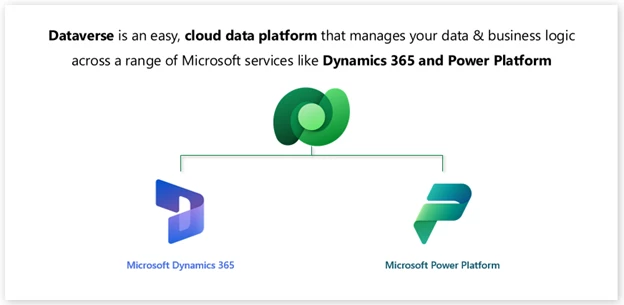
One of the primary benefits of integrating Dynamics 365 with Dataverse is the streamlined data management. Dataverse acts as a centralized repository, allowing businesses to consolidate data from various sources into a single, coherent structure. This ensures data consistency and integrity, reducing the likelihood of errors and duplications. Furthermore, it facilitates easier data sharing across departments, fostering better collaboration and aligning business strategies.
Another advantage is the enhanced analytical capabilities. With Dataverse, data from Dynamics 365 applications can be easily aggregated and analyzed, providing deeper insights into business performance. Users can create detailed reports and dashboards using Power BI, which is natively integrated with Dataverse. This capability allows for more informed decision-making, as businesses can quickly identify trends, measure key performance indicators (KPIs), and respond to market changes.
The integration also improves the customization and scalability of business solutions. Dynamics 365 applications, such as Sales, Customer Service, and Field Service, can be customized using Dataverse’s low-code development environment. This allows organizations to tailor applications to meet specific business requirements without extensive coding, reducing development time and costs. Additionally, Dataverse’s scalability ensures that as businesses grow, their data platform can effortlessly accommodate increased data volumes and complexity.
Dynamics 365 vs Dataverse
When comparing Dynamics 365 vs Dataverse, it’s important to understand that Dataverse is an integral part of the Dynamics 365 ecosystem. It provides the underlying data framework that supports the various applications within Dynamics 365, enabling a seamless and integrated user experience. This synergy between Dataverse and Dynamics 365 applications enhances overall system performance and reliability.
Is Dataverse Part of Dynamics 365?
Yes, Microsoft Dataverse is an integral part of Dynamics 365. It serves as the data backbone for Dynamics 365 applications, enabling them to store, manage, and utilize data efficiently.
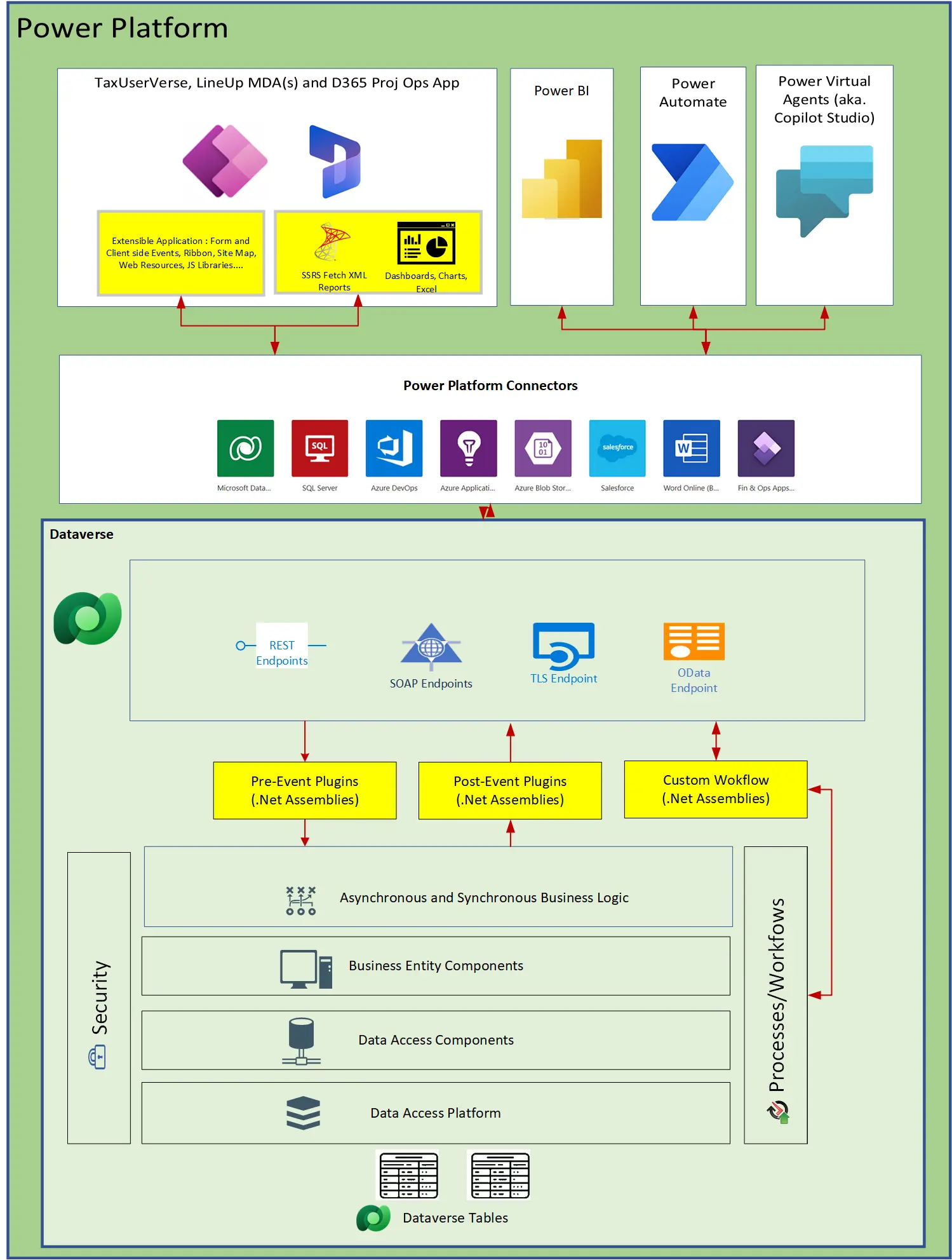
In conclusion, integrating Microsoft Dataverse with Dynamics 365 offers numerous benefits, including improved data management, enhanced analytical capabilities, and greater customization and scalability. This integration empowers businesses to optimize their operations, drive innovation, and achieve their strategic objectives more effectively.
FAQs on Microsoft Dataverse
When considering the use of Microsoft Dataverse, many common questions arise. Here’s a thorough look at some of the most frequently asked questions to help you better understand this powerful data platform.
How to access Microsoft Dataverse? Accessing Microsoft Dataverse is straightforward. It is integrated into the Microsoft Power Platform, so you can access it through Power Apps, Power Automate, or directly via the Maker Portal. Users with the necessary permissions can create, manage, and analyze data within these environments.
Is Microsoft Dataverse a data warehouse? While Dataverse can store large amounts of data, it is not strictly a data warehouse. It is more accurately described as a scalable data service and app platform that allows for the integration and storage of business data. For data warehousing needs, Microsoft recommends using Azure Synapse Analytics.
How much does Microsoft Dataverse cost? The cost of Microsoft Dataverse is included in various Microsoft Power Platform licensing plans. Specific costs can vary based on the plan and the number of users. Detailed pricing information is available on Microsoft’s official website.
How is Microsoft Dataverse licensed? Microsoft Dataverse is licensed through several Power Platform plans, including Power Apps and Power Automate. These plans offer different tiers of access and capabilities, designed to meet diverse business needs.
What was Dataverse called before? Microsoft Dataverse was formerly known as the Common Data Service (CDS). The rebranding to Dataverse was part of a broader effort to simplify the naming and improve user understanding of the platform.
What is a Common Data Service? The Common Data Service is the previous name for Microsoft Dataverse. It enables users to securely store and manage data used by business applications.
Is Common Data Service the same as Dataverse? Yes, the Common Data Service and Dataverse are the same. The name change from CDS to Dataverse reflects an evolution in the platform’s capabilities and user-friendly branding.
Is Microsoft Dataverse a premium connector? Yes, Dataverse is considered a premium connector within the Power Platform. This classification allows for advanced data integration and connectivity features, enhancing the overall functionality of business applications.
What is CDS and CDM? CDS stands for Common Data Service, now known as Microsoft Dataverse. CDM stands for Common Data Model, which is a set of standardized data schemas that Dataverse uses to ensure consistency and integration across different applications and services.
Conclusion
Microsoft Dataverse is a versatile and powerful data platform that integrates seamlessly with the Microsoft Power Platform and Dynamics 365. It provides robust data management capabilities, advanced security features, and extensive integration options, making it an ideal choice for businesses of all sizes. By leveraging Dataverse, organizations can streamline their data management processes, enhance productivity, and gain valuable insights from their data.
#MSFTAdvocate #AbhishekDhoriya #LearnWithAbhishekDhoriya #DynamixAcademy
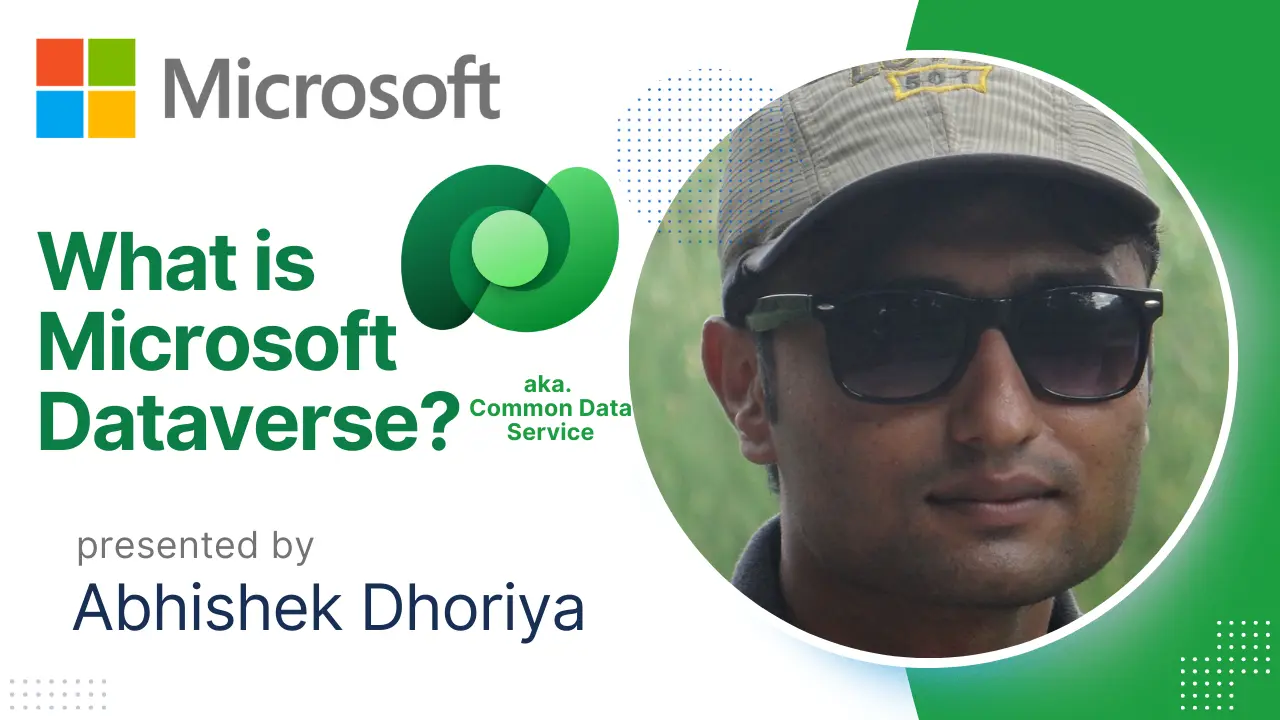
3 thoughts on “What is Microsoft Dataverse? A Comprehensive Guide 2024”